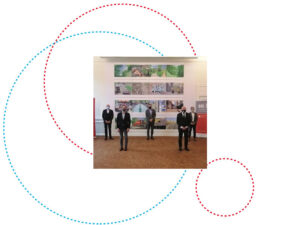The University of Luxembourg and the City of Dudelange signed a collaboration agreement for the promotion of participatory democracy. The two partners will combine their efforts to become the national reference in participatory democracy.
In Luxembourg, as in a growing number of countries, there is increasing demand from citizens and politicians to promote continuous and thorough citizen participation in the decision-making process. This reflects the feeling that communication channels of traditional representative democracy no longer meet the needs of an increasingly informed society, willing to engage in political decision-making in a non-partisan manner. The strengthening of participatory practices is also seen as an opportunity to strengthen the social link at the local and national level, as well as the Greater Region.
A national reference platform in the field of participatory democracy
Dr. Raphaël Kies of the Faculty of Humanities, Education and Social Sciences will coordinate the project.
At the municipal level one of the most important objectives is its participation in the conceptual implementation and in the scientific evaluation of present and future participatory projects in Luxembourg. As such, the City of Dudelange agrees to actively collaborate with the University and become a pilot city to allow the evaluation of existing participatory projects and the experimentation of innovative concepts (e.g. the citizen forum Biergerrot, Neischmelz, Children’s Parliament, participatory budget etc.). This includes the development of a reference website which presents all the experiences to date rolled out in the country and primarily in the city of Dudelange. This site will thus inform concisely on the origin and process of these initiatives.
At the national level, the project aims to establish a national and Greater Region network on the challenges of participatory democracy, to create synergies and to become the national reference point for any institution interested in developing participatory projects.
At the international level, the programme will participate in international calls for funding on participatory democracy, organise public events around the challenges of participatory democracy, join international networks that deal specifically with participatory democracy and continue the existing summer school “participation and democracy” (organised by the University of Luxembourg, Université Libre de Bruxelles, Université de Laval, Sciences Po Bordeaux).
Dudelange, a long-standing partner
The City of Dudelange has now been committed for several years to giving a voice to its inhabitants. Since 2015, Dudelange residents’ opinion has been solicited for several major projects in their city. They are also given the floor throughout the year, among others through advisory committees, the municipal council for children, the one for young people and interactive working sessions.
In 2019, Dudelange took the next step by launching, on the one hand, its citizen forum (“Biergerrot”) which deals with the various services currently provided by the municipality and possible avenues for improvement, and on the other hand the “citizens’ panel”, which is dedicated to expressing itself more about future projects for the city and the Dudelange of tomorrow.
An agreement that seals a long-standing partnership
The University and the city share a long history of collaboration: since 2014, Dudelange has welcomed University students in the 14 rooms of the Maison des Étudiants. In 2018, a cooperation agreement between the City of Dudelange and the University of Luxembourg was officially signed. This deepened the already strong relationship between the two institutions and opened up new avenues of collaboration, particularly in the context of research projects. It also underlined the possibility of extending the park of university residences on the territory of the city. This was done in 2019, when the Maison des Chercheurs was inaugurated to accommodate nine researchers and doctoral candidates from the University.
Download the overview of goals and plan of action
© Université du Luxembourg
